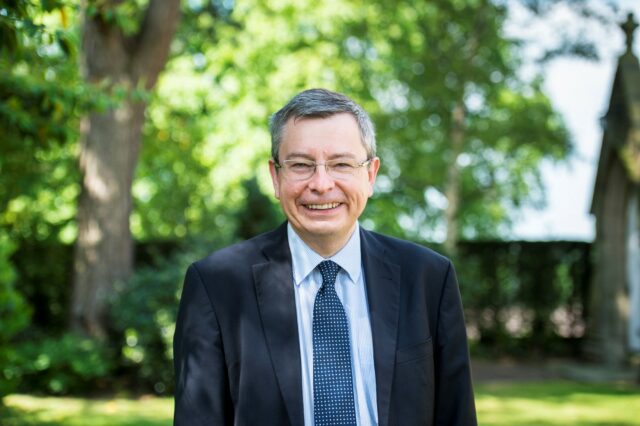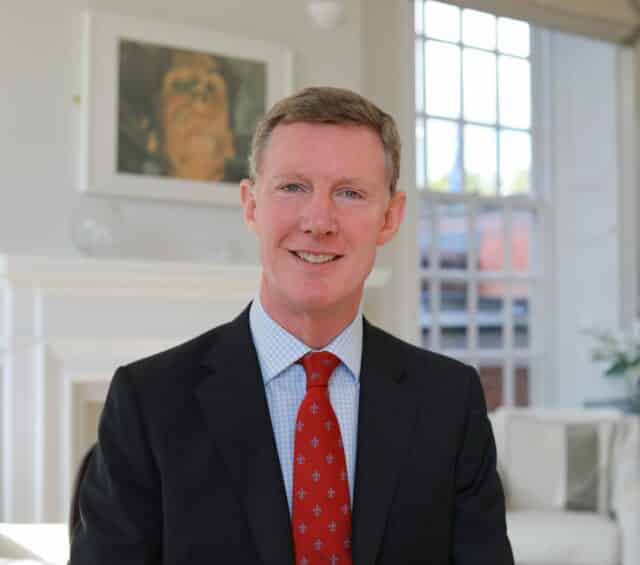Blog
Shche ne vmerla Ukrainas

Dr Simon Hyde
HMC General Secretary
Read the blog
It was Martin Luther King who reminded us that whilst the arc of the moral universe is long, it bends towards justice. Throughout history that trajectory has rarely been uninterrupted and has actively needed to be bent by the commitment and sacrifice of ordinary people.
When considering events in Ukraine it is easy to feel powerless, to consider ourselves passive observers of a conflict in a far away country with little practical relevance to our lives. Headteachers are rightly wary of political engagement. Government guidance on impartiality is unnecessary because we automatically understand that politics can be polarising. It can be divisive when our objective is to bring communities and people together.
There are some causes and events, however, that require us to speak out and Ukraine is one of those. Few of us can fail to be impressed by the simple dignity and enormous courage of President Zelenskyy. This is not just an instinctive reaction to the plight of an underdog, but the realisation that he is being called upon to lead a struggle that we all hope we would rise to, but would wish never to face. In his address in Russian to the Russian people, Zelenskyy spoke another truth when he accepted that what was happening was not being done by the Russian people, but perversely in their name.
The pained response of the heavily armed Russian soldier on Thursday when confronted by a Ukrainian woman, ‘Please let’s not make things worse’, spoke not only to the soldier’s humanity, but to his acceptance that the invasion was bad. Embarrassed laughter from the petrol-less crew of a Russian armoured vehicle greeted another brave Ukrainian’s offer to tow them back to Russia. They knew neither where they were going, nor, one suspects, why.
How else can one explain the frenzied attempts by the state media to hide the truth of what is happening in the Ukraine from the Russian people? The ties of kinship and history between the two combatants will not permit a simple acceptance of the Kremlin’s line that Kyiv’s leaders are criminals and even Nazis. As Zelenskyy testified, his grandfather fought in the Great Patriotic War, ending his career as a colonel in the Ukrainian army, having lost most of his family in the Holocaust.
National anthems often tell us much about both the history of a country and the character of its people. Shche ne vmerla Ukainas (Let Ukraine not perish) is perhaps rivalled only by the old and reborn Soviet anthem for the power of its emotion and the bitter history it reflects. ‘We will not allow others to rule our motherland’ is its conclusion and speaks volumes about the readiness of ordinary Ukrainians to resist.
So, what are the messages we should be sharing in school? The first is that freedom is not free. It comes at a cost and that cost is paid by ordinary people whether they be the Ukrainian patriot on the battlefield, the Russian protestor on the street or the European citizen fearing higher prices and heavier taxes. The second is the dictum most often attributed to Edmund Burke; that the only thing necessary for the triumph of evil is for good people to do nothing. And the third is that we should never take our own good fortune for granted. If Covid taught us anything, it is that.
Whatever his immediate fate, by his conduct in the current crisis President Zelenskyy has already won this war. He has planted himself and his people firmly on the right side of history and won a place of honour in it. Whether might or right prevails in the short term, the arc of history is again being bent toward justice with every cry of ‘slava ukraini.’

